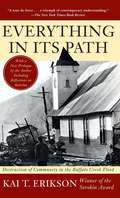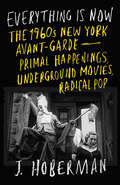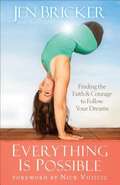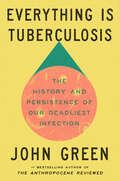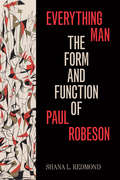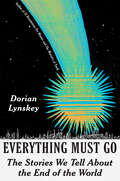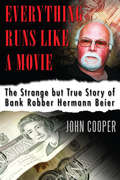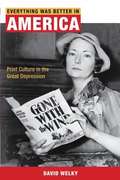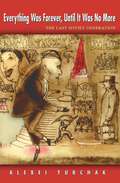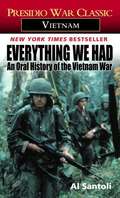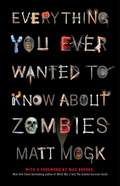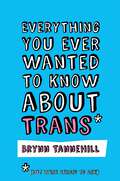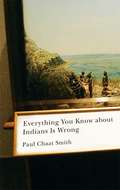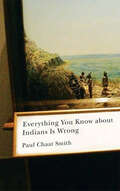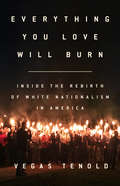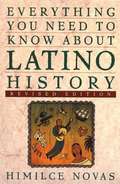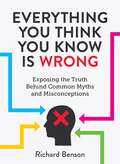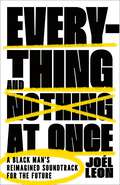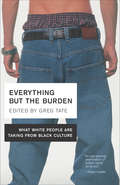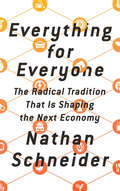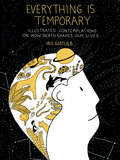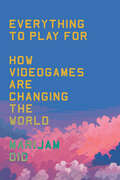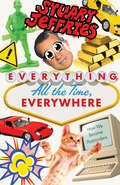- Table View
- List View
Everything In Its Path: Destruction of Community in the Buffalo Creek Flood
by Kai T. EriksonRecounts the devastating personal and communal effects of the 1972 Buffalo Creek, West Virginia, disaster on a tightly knit Appalachian community suddenly uprooted and dispersed.
Everything Is Now: The 1960s New York Avant-Garde Primal Happenings, Underground Movies, Radical Pop
by J HobermanA groundbreaking cultural history of 1960s New York, from the legendary writer on art and filmLike Paris in the 1920s, New York City in the 1960s was a cauldron of avant-garde ferment and artistic innovation. Boundaries were transgressed and new forms created. Drawing on interviews, memoirs, and the alternative press, Everything Is Now chronicles this collective drama as it was played out in coffeehouses, bars, lofts, storefront theaters, and, ultimately, the streets.The principals here are penniless filmmakers, jazz musicians, and performing poets, as well as less classifiable artists. Most were outsiders at the time. They include Amiri Baraka, Bob Dylan, Allen Ginsberg, Yayoi Kusama, Yoko Ono, Nam June Paik, Carolee Schneemann, Jack Smith, Andy Warhol, and many more. Some were associated with specific movements (Avant Rock, Destruction Art, Fluxus, Free Jazz, Guerrilla Theater, Happenings, Mimeographed Zines, Pop Art, Protest-Folk, Ridiculous Theater, Stand-Up Poetry, Underground Comix, and Underground Movies). But there were also movements of one. Their art, rooted in the detritus and excitement of urban life, was taboo-breaking and confrontational.As J. Hoberman shows in this riveting history, these subcultures coalesced into a counterculture that changed the city, the country, and the world.
Everything Is Possible: Finding The Faith And Courage To Follow Your Dreams
by Sheryl Berk Nick Vujicic Jen BrickerJen Bricker was born without legs. Shocked and uncertain they could care for her, her biological parents gave her up for adoption. In her loving adoptive home, there was just one simple rule: "Never say 'can't.'" And pretty soon, there was nothing this small but mighty powerhouse set her sights on that she couldn't conquer: roller-skating, volleyball, power tumbling, and spinning from silk ribbons thirty feet in the air. Everything Is Possible is her incredible story--a story of God working out his plan for her life from before day one. Readers follow Jen from the challenges of growing up different to holding captive audiences numbering in the tens of thousands. Everything Is Possible shows readers what they can accomplish when they remove the words coincidence and limitation from their vocabulary. Filled with heart and spirit, as well as Jen's wit, wisdom, and no-holds-barred honesty, this inspiring true story points the way to purpose and joy. Foreword by Nick Vujicic.
Everything Is Tuberculosis: The History and Persistence of Our Deadliest Infection
by John GreenJohn Green, the #1 bestselling author of The Anthropocene Reviewed and a passionate advocate for global healthcare reform, tells a deeply human story illuminating the fight against the world’s deadliest infectious disease. <p> “This highly readable call to action could not be more timely.” –Kirkus, starred review. <p> “Memorably probes the intersections of medicine and human emotion.” –Bookpage, starred review. <p> Tuberculosis has been entwined with humanity for millennia. Once romanticized as a malady of poets, today tuberculosis is seen as a disease of poverty that walks the trails of injustice and inequity we blazed for it. In 2019, author John Green met Henry Reider, a young tuberculosis patient at Lakka Government Hospital in Sierra Leone. John became fast friends with Henry, a boy with spindly legs and a big, goofy smile. In the years since that first visit to Lakka, Green has become a vocal advocate for increased access to treatment and wider awareness of the healthcare inequities that allow this curable, preventable infectious disease to also be the deadliest, killing over a million people every year. <p> In Everything Is Tuberculosis, John tells Henry’s story, woven through with the scientific and social histories of how tuberculosis has shaped our world—and how our choices will shape the future of tuberculosis. <b>New York Times Bestseller</b>
Everything Man: The Form and Function of Paul Robeson (Refiguring American Music)
by Shana L. RedmondFrom his cavernous voice and unparalleled artistry to his fearless struggle for human rights, Paul Robeson was one of the twentieth century's greatest icons and polymaths. In Everything Man Shana L. Redmond traces Robeson's continuing cultural resonances in popular culture and politics. She follows his appearance throughout the twentieth century in the forms of sonic and visual vibration and holography; theater, art, and play; and the physical environment. Redmond thereby creates an imaginative cartography in which Robeson remains present and accountable to all those he inspired and defended. With her bold and unique theorization of antiphonal life, Redmond charts the possibility of continued communication, care, and collectivity with those who are dead but never gone.
Everything Must Go: The Stories We Tell About the End of the World
by Dorian LynskeyA rich, captivating, and darkly humorous look into the evolution of apocalyptic thought, exploring how film and literature interact with developments in science, politics, and culture, and what factors drive our perennial obsession with the end of the world.As Dorian Lynskey writes, &“People have been contemplating the end of the world for millennia.&” In this immersive and compelling cultural history, Lynskey reveals how religious prophecies of the apocalypse were secularized in the early 19th century by Lord Byron and Mary Shelley in a time of dramatic social upheaval and temporary climate change, inciting a long tradition of visions of the end without gods.With a discerning eye and acerbic wit, Lynskey examines how various doomsday tropes and predictions in literature, art, music, and film have arisen from contemporary anxieties, whether they be comets, pandemics, world wars, the Cuban Missile Crisis, Y2K, or the climate emergency. Far from being grim, Lynskey guides readers through a rich array of fascinating stories and surprising facts, allowing us to keep company with celebrated works of art and the people who made them, from H.G. Wells, Jack London, W.B. Yeats and J.G. Ballard to The Twilight Zone, Dr. Strangelove, Mad Max and The Terminator.Prescient and original, Everything Must Go is a brilliant, sweeping work of history that provides many astute insights for our times and speaks to our urgent concerns for the future.
Everything Runs Like a Movie: The Strange but True Story of Bank Robber Hermann Beier
by John CooperA true story of a bank robber and a chilling car chase worthy of an Elmore Leonard novel or a Brian De Palma movie. Like many new arrivals to Canada, Hermann Beier came to this country with big dreams – visions of a wide-open country where hard work and entrepreneurial flair would make him rich. A charismatic handyman, martial arts teacher, and small business owner, he charmed women and earned the respect of men. He was loved in his community of Alliston, Ontario, and had a plan to make a million bucks. But when those dreams soured, Beier turned to crime to pay the bills. Faced with bankruptcy in 1991, Beier hatched a plan to rob a string of banks in a single day. But it was all too much, too fast. After leading authorities from Guelph to Caledon on what was then the longest police chase in Canadian history, Beier was gunned down alongside a farmer’s fence, his body pierced by a hail of police bullets. But he survived, and the end of his crime spree marked a new beginning. After spending almost a decade in various Ontario prisons, searching for a way to get his life back on track, Beier was finally paroled. He now lives a quiet life, dividing his time between Canada and Austria.
Everything Was Better in America: Print Culture in the Great Depression
by David WelkyAs a counterpart to research on the 1930s that has focused on liberal and radical writers calling for social revolution, David Welky offers this eloquent study of how mainstream print culture shaped and disseminated a message affirming conservative middle-class values and assuring its readers that holding to these values would get them through hard times. Through analysis of the era's most popular newspaper stories, magazines, and books, Welky examines how voices both outside and within the media debated the purposes of literature and the meaning of cultural literacy in a mass democracy. He presents lively discussions of such topics as the newspaper treatment of the Lindbergh kidnapping, issues of race in coverage of the 1936 Olympic games, domestic dynamics and gender politics in cartoons and magazines, Superman's evolution from a radical outsider to a spokesman for the people, and the popular consumption of such novels as the Ellery Queen mysteries, Gone with the Wind, and The Good Earth. Through these close readings, Welky uncovers the subtle relationship between the messages that mainstream media strategically crafted and those that their target audience wished to hear.
Everything Was Forever, Until It Was No More: The Last Soviet Generation (In-Formation)
by Alexei YurchakSoviet socialism was based on paradoxes that were revealed by the peculiar experience of its collapse. To the people who lived in that system the collapse seemed both completely unexpected and completely unsurprising. At the moment of collapse it suddenly became obvious that Soviet life had always seemed simultaneously eternal and stagnating, vigorous and ailing, bleak and full of promise. Although these characteristics may appear mutually exclusive, in fact they were mutually constitutive. This book explores the paradoxes of Soviet life during the period of "late socialism" (1960s-1980s) through the eyes of the last Soviet generation. Focusing on the major transformation of the 1950s at the level of discourse, ideology, language, and ritual, Alexei Yurchak traces the emergence of multiple unanticipated meanings, communities, relations, ideals, and pursuits that this transformation subsequently enabled. His historical, anthropological, and linguistic analysis draws on rich ethnographic material from Late Socialism and the post-Soviet period. The model of Soviet socialism that emerges provides an alternative to binary accounts that describe that system as a dichotomy of official culture and unofficial culture, the state and the people, public self and private self, truth and lie--and ignore the crucial fact that, for many Soviet citizens, the fundamental values, ideals, and realities of socialism were genuinely important, although they routinely transgressed and reinterpreted the norms and rules of the socialist state.
Everything We Had: An Oral History of the Vietnam War
by Al SantoliHere is an oral history of the Vietnam War by thirty-three American soldiers who fought it. A 1983 American Book Award nominee.
Everything You Ever Wanted to Know About Zombies
by Matt MogkThe most comprehensive zombie handbook ever published--with a foreword by Max Brooks! In one indispensable volume, Matt Mogk busts popular myths and answers all your raging questions about the living dead.*Q. How can I increase my chances of survival? A. One simple step is to keep away from other people. Without people there can be no zombies. Q. What is the connection between the Voodoo zombie and the flesh-eating zombie of popular culture? A. Other than a shared name, absolutely nothing. Q. Will zombies actually eat me, or will they just bite and chew? A. Research suggests the neuromuscular activity required for swallowing may be too complex for a zombie. Q. Will we see any warning signs before the dead rise? A. Unfortunately, entire populations could be infected with the zombie sickness before anyone even knows there's a problem. Q. How come Zombie Awareness Month is in May and not October? A. Unlike witches and vampires, zombies are not otherworldly creatures. They are made of flesh and blood. Don't forget to wear your gray ribbon. * Many more questions about zombies--including why not all of them are undead--are answered inside the book.
Everything You Ever Wanted to Know About Zombies
by Matt MogkTHE MOST COMPREHENSIVE ZOMBIE HANDBOOK EVER PUBLISHED In one indispensable volume, Matt Mogk, founder and head of the Zombie Research Society, busts popular myths and answers all your raging questions about the living dead.* Q. How can I increase my chances of survival? A. One simple step is to keep away from other people. Without people there can be no zombies. Q. What is the connection between the Voodoo zombie and the flesh-eating zombie of popular culture? A. Other than a shared name, absolutely nothing. Q. Will zombies actually eat me, or will they just bite and chew? A. Research suggests the neuromuscular activity required for swallowing may be too complex for a zombie. Q. Will we see any warning signs before the dead rise? A. Unfortunately, entire populations could be infected with the zombie sickness before anyone even knows there's a problem. Q. How come Zombie Awareness Month is in May and not October? A. Unlike witches and vampires, zombies are not otherworldly creatures. They are made of flesh and blood. Don't forget to wear your gray ribbon. * Many more questions about zombies--including why not all of them are undead--are answered inside the book.
Everything You Ever Wanted to Know about Trans (But Were Afraid to Ask)
by Brynn TannehillLeading activist and essayist Brynn Tannehill tells you everything you ever wanted to know about transgender issues but were afraid to ask. The book aims to break down deeply held misconceptions about trans people across all aspects of life, from politics, law and culture, through to science, religion and mental health, to provide readers with a deeper understanding of what it means to be trans.The book walks the reader through transgender issues, starting with "What does transgender mean?" before moving on to more complex topics including growing up trans, dating and sex, medical and mental health, and debates around gender and feminism. Brynn also challenges deliberately deceptive information about transgender people being put out into the public sphere. Transphobic myths are debunked and biased research, bad statistics and bad science are carefully and clearly refuted.This important and engaging book enables any reader to become informed the most critical public conversations around transgender people, and become a better ally as a result.
Everything You Know About Indians Is Wrong (Indigenous Americas)
by Paul Chaat SmithIn this sweeping work of memoir and commentary, leading cultural critic Paul Chaat Smith illustrates with dry wit and brutal honesty the contradictions of life in “the Indian business.” <p><p> Raised in suburban Maryland and Oklahoma, Smith dove head first into the political radicalism of the 1970s, working with the American Indian Movement until it dissolved into dysfunction and infighting. Afterward he lived in New York, the city of choice for political exiles, and eventually arrived in Washington, D.C., at the newly minted National Museum of the American Indian (“a bad idea whose time has come”) as a curator. In his journey from fighting activist to federal employee, Smith tells us he has discovered at least two things: there is no one true representation of the American Indian experience, and even the best of intentions sometimes ends in catastrophe. <p> Everything You Know about Indians Is Wrong is a highly entertaining and, at times, searing critique of the deeply disputed role of American Indians in the United States. In “A Place Called Irony,” Smith whizzes through his early life, showing us the ironic pop culture signposts that marked this Native American's coming of age in suburbia: “We would order Chinese food and slap a favorite video into the machine—the Grammy Awards or a Reagan press conference—and argue about Cyndi Lauper or who should coach the Knicks.” In “Lost in Translation,” Smith explores why American Indians are so often misunderstood and misrepresented in today's media: “We're lousy television.” In “Every Picture Tells a Story,” Smith remembers his Comanche grandfather as he muses on the images of American Indians as “a half-remembered presence, both comforting and dangerous, lurking just below the surface.” <p> Smith walks this tightrope between comforting and dangerous, offering unrepentant skepticism and, ultimately, empathy. “This book is called Everything You Know about Indians Is Wrong, but it's a book title, folks, not to be taken literally. Of course I don't mean everything, just most things. And 'you' really means we, as in all of us.”
Everything You Know about Indians Is Wrong (Indigenous Americas)
by Paul Chaat SmithIn this sweeping work of memoir and commentary, leading cultural critic Paul Chaat Smith illustrates with dry wit and brutal honesty the contradictions of life in &“the Indian business.&” Raised in suburban Maryland and Oklahoma, Smith dove head first into the political radicalism of the 1970s, working with the American Indian Movement until it dissolved into dysfunction and infighting. Afterward he lived in New York, the city of choice for political exiles, and eventually arrived in Washington, D.C., at the newly minted National Museum of the American Indian (&“a bad idea whose time has come&”) as a curator. In his journey from fighting activist to federal employee, Smith tells us he has discovered at least two things: there is no one true representation of the American Indian experience, and even the best of intentions sometimes ends in catastrophe. Everything You Know about Indians Is Wrong is a highly entertaining and, at times, searing critique of the deeply disputed role of American Indians in the United States. In &“A Place Called Irony,&” Smith whizzes through his early life, showing us the ironic pop culture signposts that marked this Native American&’s coming of age in suburbia: &“We would order Chinese food and slap a favorite video into the machine—the Grammy Awards or a Reagan press conference—and argue about Cyndi Lauper or who should coach the Knicks.&” In &“Lost in Translation,&” Smith explores why American Indians are so often misunderstood and misrepresented in today&’s media: &“We&’re lousy television.&” In &“Every Picture Tells a Story,&” Smith remembers his Comanche grandfather as he muses on the images of American Indians as &“a half-remembered presence, both comforting and dangerous, lurking just below the surface.&” Smith walks this tightrope between comforting and dangerous, offering unrepentant skepticism and, ultimately, empathy. &“This book is called Everything You Know about Indians Is Wrong, but it&’s a book title, folks, not to be taken literally. Of course I don&’t mean everything, just most things. And &‘you&’ really means we, as in all of us.&”
Everything You Love Will Burn: Inside the Rebirth of White Nationalism in America
by Vegas TenoldThe dark story of the shocking resurgence of white supremacist and nationalist groups, and their path to political powerSix years ago, Vegas Tenold embedded himself among the members of three of America's most ideologically extreme white nationalist groups-the KKK, the National Socialist Movement, and the Traditionalist Workers Party. At the time, these groups were part of a disorganized counterculture that felt far from the mainstream.But since then, all that has changed. Racially-motivated violence has been on open display at rallies in Charlottesville, Berkeley, Pikesville, Phoenix, and Boston. Membership in white nationalist organizations is rising, and national politicians, including the president, are validating their perceived grievances.Everything You Love Will Burn offers a terrifying, sobering inside look at these newly empowered movements, from their conventions to backroom meetings with Republican operatives. Tenold introduces us to neo-Nazis in Brooklyn; a millennial Klanswoman in Tennessee; and a rising star in the movement, nicknamed the "Little Führer" by the Southern Poverty Law Center, who understands political power and is organizing a grand coalition of far-right groups to bring them into the mainstream.Everything You Love Will Burn takes readers to the dark, paranoid underbelly of America, a world in which the white race is under threat and the enemy is everywhere.
Everything You Need to Know about Latino History
by Himilce NovasIf you eat fajitas, listen to Selena, have studied the Spanish-American War, read Julia Alvarez, visited Miami, or seen Charlie Sheen in a movie, you're probably aware that Latino culture is an integral part of American life. But most Americans do not know much about Latino history, or realize the impact it has on the politics, economy, and culture of American life. <P>"Everything You Need to Know About Latino History" covers the contributions of Spaniards, Mexicans, Puerto Ricans, Cubans, Dominicans, and Central and South Americans whose cultures have given us everything from chocolate to chili peppers, from mambo to machismo, and from Desi Arnaz to Oscar Hijuelos. Presented in a question and answer format, this revised edition includes new information on Central and South Americans, the largest group of new Latino immigrants, the passing of Proposition 187 in California, and how Latino women are playing a larger role in politics and the arts. This accessible reference book is perfect for boththe history buff and the curious reader who want to learn more about Latino American history.
Everything You Think You Know is Wrong: Exposing the Truth Behind Common Myths and Misconceptions
by Richard BensonDo you believe that goldfish have a 3-second memory span? Do you think coffee comes from a bean? If so, you’ve been lied to. But this book will set the record straight, so next time someone claims that Napoleon was short, or that shaving causes hair to grow back thicker, you can tell them smugly that everything they think they know is wrong.
Everything and Nothing at Once: A Black Man's Reimagined Soundtrack for the Future
by Joél LeonFor readers of Kiese Laymon’s Heavy and Hanif Abdurraqib’s A Little Devil in America, a beautiful, painful, and soaring tribute to everything that Black men are and can beGrowing up in the Bronx, Joél Leon was taught that being soft, being vulnerable, could end your life. Shaped by a singular view of Black masculinity espoused by the media, family and friends, and society, he learned instead to care about the gold around his neck and the number of bills in his wallet. He absorbed the “facts” that white was always right and that Black men were either threatening or great for comic relief but never worthy of the opening credits. It wasn’t until years later that Joél understood he didn’t have to be defined by these and other stereotypes.Now, in a collection of wide-ranging essays, he takes readers from his upbringing in the Bronx to his life raising two little girls of his own, unraveling those narratives to arrive at a deeper understanding of who he is as a son, friend, partner, and father. Traversing both the serious and the lighthearted, from contemplating male beauty standards to his decision to seek therapy to the difficulties of making co-parenting work, Joél cracks open his heart to reveal his multitudes.In this book crafted like an album, each essay is a single that stands alone yet reverberates throughout the entire collection. Pieces like “How to Make a Black Friend” consider challenging, delightful, and absurd moments in relationships, while others like “Sensitive Thugs You All Need Hugs” and “All Gold Everything” ponder the collective harms of society's lens.With incisive, searing prose, Everything and Nothing at Once deconstructs what it means to be a Black man in America.
Everything but the Burden: What White People Are Taking from Black Culture
by Greg TateMixing straight academic commentary with poems, excerpts from plays, and other more literature-oriented material, 18 contributions grapple with White America's appropriation of Black Culture. From Eminem to communist revolutionaries, a variety of kinds of appropriation are examined from a range of analytical perspectives. Tate ( also includes contributions that address Black appropriations of White and other cultures. Annotation (c)2003 Book News, Inc. , Portland, OR (booknews. com)
Everything for Everyone: The Radical Tradition That Is Shaping the Next Economy
by Nathan SchneiderThe origins of the next radical economy is rooted in a tradition that has empowered people for centuries and is now making a comeback.A new feudalism is on the rise. While monopolistic corporations feed their spoils to the rich, more and more of us are expected to live gig to gig. But, as Nathan Schneider shows, an alternative to the robber-baron economy is hiding in plain sight; we just need to know where to look.Cooperatives are jointly owned, democratically controlled enterprises that advance the economic, social, and cultural interests of their members. They often emerge during moments of crisis not unlike our own, putting people in charge of the workplaces, credit unions, grocery stores, healthcare, and utilities they depend on.Everything for Everyone chronicles this revolution--from taxi cooperatives keeping Uber at bay, to an outspoken mayor transforming his city in the Deep South, to a fugitive building a fairer version of Bitcoin, to the rural electric co-op members who are propelling an aging system into the future. As these pioneers show, co-ops are helping us rediscover our capacity for creative, powerful, and fair democracy.
Everything is Temporary: Illustrated Contemplations on How Death Shapes Our Lives
by Iris GottliebA beautiful, illustrated reflection on death, mortality, and what it means to be human.It is an unavoidable fact of life that one day, you will die. Until very recently, death was a subject that many people hid from. But in a post-pandemic world in which a new generation is beginning to care for aging parents, it&’s time to start talking about dying. In this at-times-heartbreaking yet heartwarming book, author and illustrator Iris Gottlieb explores death from all angles—from the physical, such as the ways your remains could be handled, to the emotional, including grief and grappling with your own mortality. And by the end, you will start to answer the question, So how do you live with death? Part explainer, part conversation-starter, and part helping hand to accept the inevitable, Everything Is Temporary will encourage conversations with loved ones and invite introspection to find more internal peace.
Everything to Play For: An Insider's Guide to How Videogames are Changing Our World
by Marijam DidAn insider&’s account of the videogame industry telling how gaming can become a force for goodEverything To Play For asks if videogames can achieve egalitarian goals instead of fuelling hyper-materialist, reactionary agendas. Combining cultural theory and materialist critiques with accessible language and personal anecdotes, industry insider Marijam Did engages both novices and seasoned connoisseurs. From the innovations of Pong and Doom to the intricate multiplayer or narrative-driven games, the author highlights the multifaceted stories of the gaming communities and the political actors who organise among them. Crucially, the focus also includes the people who make the games, shedding light on the brutal processes necessary to bring titles to the public.The videogame industry, now larger than the film and music industries combined, has a proven ability to challenge the status quo. With a rich array of examples, Did argues for a nuanced understanding of gaming&’s influence so that this extraordinary power can be harnessed for good.
Everything's Trash, But It's Okay
by Phoebe Robinson Ilana GlazerEntertainment Weekly's Fall 2018's 25 Must-ReadsEssence's Fall 2018 Guide to All Things FunnyBustle's 18 New Nonfiction Books to Know in October"Robinson offers deft cultural criticism and hilarious personal anecdotes that will make readers laugh, cringe, and cry. Everything may indeed be trash but writing like this reminds us that we're gonna make it through all the terrible things with honesty, laughter, and faith."--Roxane Gay, New York Times bestselling authorNew York Times bestselling author and star of 2 Dope Queens Phoebe Robinson is back with a new, hilarious, and timely essay collection on gender, race, dating, and the dumpster fire that is our world.Written in her trademark unfiltered and witty style, Robinson's latest collection is a call to arms. Outfitted with on-point pop culture references, these essays tackle a wide range of topics: giving feminism a tough-love talk on intersectionality, telling society's beauty standards to kick rocks, and calling foul on our culture's obsession with work. Robinson also gets personal, exploring money problems she's hidden from her parents, how dating is mainly a warmed-over bowl of hot mess, and definitely most important, meeting Bono not once, but twice. She's struggled with being a woman with a political mind and a woman with an ever-changing jeans size. She knows about trash because she sees it every day--and because she's seen roughly one hundred thousand hours of reality TV and zero hours of Schindler's List.With the intimate voice of a new best friend, Everything's Trash, But It's Okay is a candid perspective for a generation that has had the rug pulled out from under it too many times to count.
Everything, All the Time, Everywhere: How We Became Postmodern
by Stuart JeffriesA radical new history of a dangerous ideaPost-Modernity is the creative destruction that has shattered our present times into fragments. It dynamited modernism which had dominated the western world for most of the 20th century. Post-modernism stood for everything modernism rejected: fun, exuberance, irresponsibility. But beneath its glitzy surface, post-modernism had a dirty secret: it was the fig leaf for a rapacious new kind of capitalism. It was also the forcing ground of the 'post truth', by means of which western values got turned upside down.But where do these ideas come from and how have they impacted on the world? In his brilliant history of a dangerous idea, Stuart Jeffries tells a narrative that starts in the early 1970s and continue to today. He tells this history through a riotous gallery that includes David Bowie, the Ipod, Frederic Jameson, the demolition of Pruit-Igoe, Madonna, Post-Fordism, Jeff Koon's 'Rabbit', Deleuze and Guattari, the Nixon Shock, The Bowery series, Judith Butler, Las Vegas, Margaret Thatcher, Grand Master Flash, I Love Dick, the RAND Corporation, the Sex Pistols, Princess Diana, the Musee D'Orsay, Grand Theft Auto, Perry Anderson, Netflix, 9/11We are today scarcely capable of conceiving politics as a communal activity because we have become habituated to being consumers rather than citizens. Politicians treat us as consumers to whom they must deliver. Can we do anything else than suffer from buyer's remorse?
